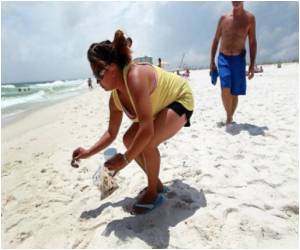Scientists have developed a new material containing soap like molecules, that can turn oil into a solid gel - a property that could help clean the Gulf oil spill mess.

Larger scale experiments are needed to examine its safety, effectiveness and cost in a full-scale oil spill.
George John of the City College of New York and Srinivasa Raghavan of the University of Maryland developed the compound.
When the molecules hit water, the molecules create a sponge-like network of fibres that strongly attract oil and repel water.
The oil is drawn into the fibre network, swelling the "sponge" creating oil-swollen gel that's strong enough to be scooped up with a slotted spoon.
Another advantage is the light weight, so they can't sink to the bottom of the ocean. Also, the new material is made of non-toxic components used in food, John said.
Source-ANI
 MEDINDIA
MEDINDIA


 Email
Email





